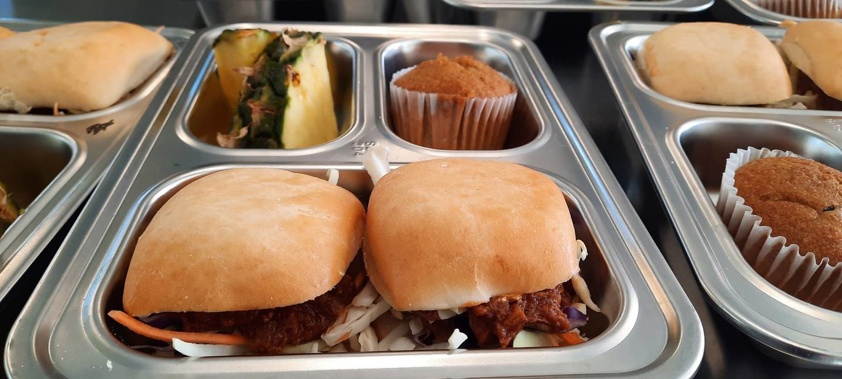
A peanut butter sandwich, a piece of fruit and a packet of corn chips is the kind of simple school lunch option Ollie Calder would like to eat each day.
Instead, he and his classmates are being served up things like reheated kumara mash or meatball burgers as part of the Government's Ka Ora, Ka Ako Healthy Lunches in School programme.
The Ministry of Education initiative started in 2020 and aims to reduce food insecurity by providing access to a nutritious daily lunch.
One hundred and seven Te Taitokerau schools currently receive lunches as part of the programme, with 11 suppliers providing school lunches to 69 schools or kura each day.
Ollie's Far North school relies on receiving pre-prepared meals from a local supplier.
While the concept might sound great, Ollie's mum Heather said the food supplied was not something even she would eat.
"We tried the school lunches, but nine times out of 10 Ollie didn't like it, so we just gave up," Heather said.
"We had to start sending his packed lunch again which I know a lot of other parents are doing now too.
"Some of it just really isn't nice and I've often looked at it myself and thought, yuck!"
Ollie's indifference towards the school lunches is not unique, with large amounts of food waste allegedly being thrown out each day across the region.
- NZ's saddest school lunch? Kids served stone-cold free meal two hours late
- Salad, hangi, cauliflower tacos not healthy enough for free school lunches
Another Far North parent, who did not wish to be named, said she too had concerns.
The mother of two (9 and 14) said her children used to take (mostly) nutritious food packed in reusable lunchboxes.
She claimed at one of her children's schools, no one ensured children were eating lunch and discouraged them from bringing lunch from home.
This child, the mother said, was generally not eating lunch at all now and would come home ravenous.
She said at her other child's school, lunch eating was supervised, but if not eaten within a certain timeframe, would come home uneaten.
"This child has noticeably become less healthy and I assume it is the number of empty carbohydrates in the school lunches," the mother said.
"While the school lunches will be an improvement for some children, there are dietary shortfalls coming from mass-produced food which is made to fit budget criteria."
The concerned parent said the amount of single-use packaging was also 'mind-boggling' at a time when people were being encouraged to be conscious of their carbon footprint.
Intermediate student, Naki, said his Northland school had been receiving school lunches for around a year and a half.
He claimed the lunches were hit and miss, with students often complaining about lunches being 'gross, stale, soggy, dry and tasting yuck'.
"Most of my friends bring lunch to school now and have started doing this after the first term of having lunches in school," he said.
"At first there wasn't enough lunch for everyone ... that stopped pretty quickly once everyone figured out they were gross most of the time."
Naki explained when something was 'yuck' there could be up to 20-30 lunch packs left.
"I don't think anyone would eat what we get given," he said.
"What we'd really like is a sandwich, fruit, chips, shapes and or home baking or something warm during winter that has flavour and is filling."
In Te Taitokerau, 35 schools make their own lunches, with one school a mixed model (some days made onsite, other days outsourced).
Another 'internal' school provided lunches for its and another school's students and one school used shelf-stable food.
Peria School is one of the Far North schools that cooks all meals on site.
Its 63 students receive everything from bento bowls to quiche, sandwiches, sushi, wraps and soup.
Principal Ariana Williams said her school had been part of the programme since 2021, with funding covering the cost of chefs, kai (food) and other additional expenses.
Williams explained when the school first started, it had no commercial kitchen, so had used the school's 5YA money to build one in an unused building.
"We now have a fully operational commercial kitchen on site and three chefs, who are parents of students at our school," Williams said.
"They all work on different days to make the lunches, with one supervisor chef who creates the menus each week.
"Each term we ask the students what they like and if we notice an increase in food waste we know to amend our menu."
Williams admitted many parents were sceptical about their children eating the school lunches.
After the first term, however, they had 100 per cent uptake of students and teachers noticed an improvement in their ability to focus and learn.
She said changing meal times had helped minimise food waste, as had the use of stainless steel bento boxes.
"Our students are more mindful of waste because they see the effort our chefs put into making the food," she said.
"Any food waste goes to the local pigs and chickens, or into the school's composting and worm farms.
"I would recommend having a kitchen on site because it's meant our carbon footprint has lessened as we don't get our food brought in."
Ārāma Gardens & Nursery is a 'pleasure garden' located in Peria, promoting sustainability of the local environment through the creation and education of sustainable land practices.
The volunteer-led organisation worked with around 20 local Far North schools last year to collect and process single-use compostable packages received from local lunch providers.
Founder Aaron Fahey said the group was already in the process of setting up a community composting hub when approached by a local provider to get involved.
Fahey said it seemed like a good way to collect the carbon element required for composting and to divert waste from going into a landfill.
Around 10 tonnes of waste was received, but was far more time-consuming than Fahey anticipated.
"The packaging was resistant to breaking down because of the aqueous layer preventing them from being able to take up water quickly," he said.
"Contamination of other forms of non-compostable waste in the bags of packaging was also an issue.
"We decided to stop collecting them, (mainly because) we felt we were essentially propping up a system that was not, in our opinion, the best solution."
Fahey said the sustainability of the whole life cycle needed to be considered and suggested to providers the idea of using reusable metal dishes.
Te Taitokerau Principals Association chair Pat Newman said he'd heard mainly positive feedback from schools regarding the programme.
He said it was important to ensure kids were getting fed and hoped the standard of some suppliers was not ruining it for all.
"A lot of our kids like it and need it, although I can't really comment on the food being supplied by external providers," Newman said.
"We've fought for years to be able to feed our kids and this programme saves parents at least $20-$30 per week per child for lunches.
"I think there was a bit of difficulty when this first started which made it hard for schools to do it themselves.
"I think that has been eased considerably and I'd hate for the overall concept to be seen as a negative because there is one supplier that's not quite up to scratch."
According to the Ministry of Education acting hautū (leader) operations and integration Helen Hurst, untouched lunches were defined as 'surplus', with partially eaten lunches considered food waste.
Hurst said the ministry continued to work with schools, kura and suppliers to reduce waste.
"With on-site attendance currently fluctuating due to illness, we encourage schools and kura to adjust their orders to reduce surplus during this time," Hurst said.
In terms of engaging external providers, Hurst said these were selected through an open tender process.
In order to be successful, suppliers must meet all Food Act 2014 requirements and have a good food safety track record.
Hurst said the ministry would work alongside schools and kura wanting to make their own lunches to help them get up and running.
Take your Radio, Podcasts and Music with you









